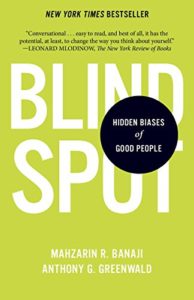
Blind Spot: Hidden Biases of Good People
By Mahzarin Banaji and Anthony Greenwald
272 pages
In Blindspot, Mahzarin Banaji and Anthony Greenwald explore hidden biases that we all carry from a lifetime of experiences with social groups – age, gender, race, ethnicity, religion, social class, sexuality, disability status, or nationality. “Blindspot” is a metaphor to capture that portion of the mind that houses hidden biases. The authors use it to ask about the extent to which social groups – without our awareness or conscious control – shape our likes and dislikes, our judgments about people’s character, abilities, and potential. In Blindspot, hidden biases are revealed through hands-on experience with the method that has revolutionized the way scientists are learning about the human mind and that gives us a glimpse into what lies within the metaphoric blindspot – the Implicit Association Test. The title’s “good people” are the many people – the authors included – who strive to align their behavior with their good intentions. The aim of Blindspot is to explain the science in plain enough language to allow well-intentioned people to better achieve that alignment. Venturing into this book is an invitation to understand our own minds.
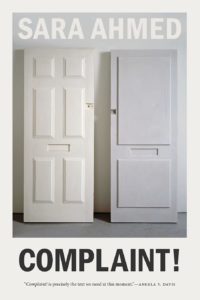
In Complaint! Sara Ahmed examines what we can learn about power from those who complain about abuses of power. Drawing on oral and written testimonies from academics and students who have made complaints about harassment, bullying, and unequal working conditions at universities, Ahmed explores the gap between what is supposed to happen when complaints are made and what actually happens. To make complaints within institutions is to learn how they work and for whom they work: complaint as feminist pedagogy. Ahmed explores how complaints are made behind closed doors and how doors are often closed on those who complain. To open these doors—to get complaints through, keep them going, or keep them alive—Ahmed emphasizes, requires forming new kinds of collectives. This book offers a systematic analysis of the methods used to stop complaints and a powerful and poetic meditation on what complaints can be used to do. Following a long lineage of Black feminist and feminist of color critiques of the university, Ahmed delivers a timely consideration of how institutional change becomes possible and why it is necessary.
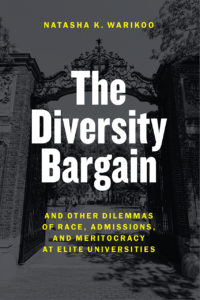
The Diversity Bargain: And Other Dilemmas of Race, Admissions, and Meritocracy at Elite Universities
By Natasha Warikoo
320 pages
https://press.uchicago.edu/ucp/books/book/chicago/D/bo24550619.html
We’ve heard plenty from politicians and experts on affirmative action and higher education, about how universities should intervene—if at all—to ensure a diverse but deserving student population. But what about those for whom these issues matter the most? In this book, Natasha K. Warikoo deeply explores how students themselves think about merit and race at a uniquely pivotal moment: after they have just won the most competitive game of their lives and gained admittance to one of the world’s top universities. What Warikoo uncovers—talking with both white students and students of color at Harvard, Brown, and Oxford—is absolutely illuminating; and some of it is positively shocking. As she shows, many elite white students understand the value of diversity abstractly, but they ignore the real problems that racial inequality causes and that diversity programs are meant to solve. They stand in fear of being labeled a racist, but they are quick to call foul should a diversity program appear at all to hamper their own chances for advancement. The most troubling result of this ambivalence is what she calls the “diversity bargain,” in which white students reluctantly agree with affirmative action as long as it benefits them by providing a diverse learning environment—racial diversity, in this way, is a commodity, a selling point on a brochure. And as Warikoo shows, universities play a big part in creating these situations. The way they talk about race on campus and the kinds of diversity programs they offer have a huge impact on student attitudes, shaping them either toward ambivalence or, in better cases, toward more productive and considerate understandings of racial difference. Ultimately, this book demonstrates just how slippery the notions of race, merit, and privilege can be. In doing so, it asks important questions not just about college admissions but what the elite students who have succeeded at it—who will be the world’s future leaders—will do with the social inequalities of the wider world.
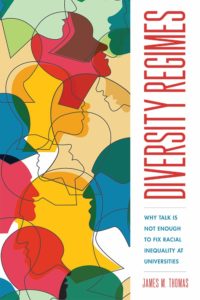
Diversity Regimes: Why Talk Is Not Enough to Fix Racial Inequality at Universities
By James M. Thomas
256 pages
https://www.rutgersuniversitypress.org/diversity-regimes/9781978800410
As a major, public flagship university in the American South, so-called “Diversity University” has struggled to define its commitments to diversity and inclusion, and to put those commitments into practice. In Diversity Regimes, sociologist James M. Thomas draws on more than two years of ethnographic fieldwork at DU to illustrate the conflicts and contingencies between a core set of actors at DU over what diversity is and how it should be accomplished. Thomas’s analysis of this dynamic process uncovers what he calls “diversity regimes”: a complex combination of meanings, practices, and actions that work to institutionalize commitments to diversity, but in doing so obscure, entrench, and even magnify existing racial inequalities. Thomas’s concept of diversity regimes, and his focus on how they are organized and unfold in real time, provides new insights into the social organization of multicultural principles and practices.
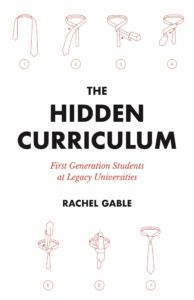
The Hidden Curriculum: First Generation Students at Legacy Universities
By Rachel Gable
264 pages
https://press.princeton.edu/books/hardcover/9780691190761/the-hidden-curriculum
College has long been viewed as an opportunity for advancement and mobility for talented students regardless of background. Yet for first generation students, elite universities can often seem like bastions of privilege, with unspoken academic norms and social rules. The Hidden Curriculum draws on more than one hundred in-depth interviews with students at Harvard and Georgetown to offer vital lessons about the challenges of being the first in the family to go to college, while also providing invaluable insights into the hurdles that all undergraduates face. As Rachel Gable follows two cohorts of first generation students and their continuing generation peers, she discovers surprising similarities as well as striking differences in their college experiences. She reveals how the hidden curriculum at legacy universities often catches first generation students off guard, and poignantly describes the disorienting encounters on campus that confound them and threaten to derail their success. Gable shows how first-gens are as varied as any other demographic group, and urges universities to make the most of the diverse perspectives and insights these talented students have to offer. The Hidden Curriculum gives essential guidance on the critical questions that university leaders need to consider as they strive to support first generation students on campus, and demonstrates how universities can balance historical legacies and elite status with practices and policies that are equitable and inclusive for all students.

How Did You Get Here? Students with Disabilities and Their Journeys to Harvard
By Thomas Hehir and Laura A. Schifter
264 pages
https://www.hepg.org/hep-home/books/how-did-you-get-here
When their children were young, several parents interviewed in this book were told “you can’t expect much from your child.” As they got older, the kids themselves often heard the same thing: that as children with disabilities, academic success would be elusive, if not impossible, for them.
How Did You Get Here? clearly refutes these common, destructive assumptions. It chronicles the educational experiences—from early childhood through college—of sixteen students with disabilities and their paths to personal and academic success at Harvard University. The book explores common themes in their lives—including educational strategies, technologies, and undaunted intellectual ambitions—as well as the crucial roles played by parents, teachers, and other professionals. Above all, it provides a clear and candid account—in the voices of the students themselves—of what it takes to grapple effectively with the many challenges facing young people with disabilities.
A compelling and practical book, How Did You Get Here? offers clear accounts not only of the challenges and biases facing young disabled students, but also of the opportunities they found, and created, on the way to academic and personal success.
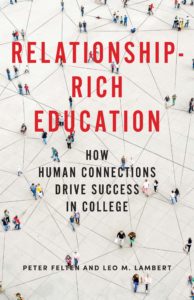
Relationship-Rich Education: How Human Connections Drive Success in College
By Peter Felten And Leo M. Lambert
208 pages
https://www.press.jhu.edu/books/title/12146/relationship-rich-education
A mentor, advisor, or even a friend? Making connections in college makes all the difference. What single factor makes for an excellent college education? As it turns out, it’s pretty simple: human relationships. Decades of research demonstrate the transformative potential and the lasting legacies of a relationship-rich college experience. Critics suggest that to build connections with peers, faculty, staff, and other mentors is expensive and only an option at elite institutions where instructors have the luxury of time with students. But in this revelatory book brimming with the voices of students, faculty, and staff from across the country, Peter Felten and Leo M. Lambert argue that relationship-rich environments can and should exist for all students at all types of institutions. In Relationship-Rich Education, Felten and Lambert demonstrate that for relationships to be central in undergraduate education, colleges and universities do not require immense resources, privileged students, or specially qualified faculty and staff. All students learn best in an environment characterized by high expectation and high support, and all faculty and staff can learn to teach and work in ways that enable relationship-based education. Emphasizing the centrality of the classroom experience to fostering quality relationships, Felten and Lambert focus on students’ influence in shaping the learning environment for their peers, as well as the key difference a single, well-timed conversation can make in a student’s life. They also stress that relationship-rich education is particularly important for first-generation college students, who bring significant capacities to college but often face long-standing inequities and barriers to attaining their educational aspirations. Drawing on nearly 400 interviews with students, faculty, and staff at 29 higher education institutions across the country, Relationship-Rich Education provides readers with practical advice on how they can develop and sustain powerful relationship-based learning in their own contexts. Ultimately, the book is an invitation—and a challenge—for faculty, administrators, and student life staff to move relationships from the periphery to the center of undergraduate education.
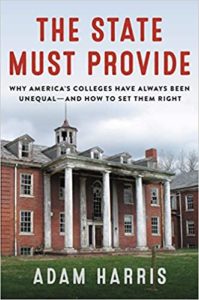
The State Must Provide: Why America’s Colleges Have Always Been Unequal– And How to Set Them Right
By Adam Harris
272 pages
https://www.harpercollins.com/products/the-state-must-provide-adam-harris?variant=33007266791458
The definitive history of the pervasiveness of racial inequality in American higher education. America’s colleges and universities have a shameful secret: they have never given Black people a fair chance to succeed. From its inception, our higher education system was not built on equality or accessibility, but on educating—and prioritizing—white students. Black students have always been an afterthought. While governments and private donors funnel money into majority white schools, historically Black colleges and universities (HBCUs), and other institutions that have high enrollments of Black students, are struggling to survive, with state legislatures siphoning away federal funds that are legally owed to these schools. In The State Must Provide, Adam Harris reckons with the history of a higher education system that has systematically excluded Black people from its benefits. Harris weaves through the legal, social, and political obstacles erected to block equitable education in the United States, studying the Black Americans who fought their way to an education, pivotal Supreme Court cases like Plessy v. Ferguson and Brown v. Board of Education, and the government’s role in creating and upholding a segregated education system. He explores the role that Civil War–era legislation intended to bring agricultural education to the masses had in creating the HBCUs that have played such a major part in educating Black students when other state and private institutions refused to accept them. The State Must Provide is the definitive chronicle of higher education’s failed attempts at equality and the long road still in front of us to remedy centuries of racial discrimination—and poses a daring solution to help solve the underfunding of HBCUs. Told through a vivid cast of characters, The State Must Provide examines what happened before and after schools were supposedly integrated in the twentieth century, and why higher education remains broken to this day.
 Quiet: The Power of Introverts in a World That Can’t Stop Talking
Quiet: The Power of Introverts in a World That Can’t Stop Talking
by Susan Cain
368 pages
https://www.thepowerofintroverts.com/about-the-book/
At least one-third of the people we know are introverts. They are the ones who prefer listening to speaking; who innovate and create but dislike self-promotion; who favor working on their own over working in teams. It is to introverts—Rosa Parks, Chopin, Dr. Seuss, Steve Wozniak—that we owe many of the great contributions to society.
In Quiet, Susan Cain argues that we dramatically undervalue introverts and shows how much we lose in doing so. She charts the rise of the Extrovert Ideal throughout the twentieth century and explores how deeply it has come to permeate our culture. She also introduces us to successful introverts—from a witty, high-octane public speaker who recharges in solitude after his talks, to a record-breaking salesman who quietly taps into the power of questions. Passionately argued, impeccably researched, and filled with indelible stories of real people, Quiet has the power to permanently change how we see introverts and, equally important, how they see themselves.
 Teaching Interculturally: A Framework for Integrating Disciplinary Knowledge and Intercultural Development
Teaching Interculturally: A Framework for Integrating Disciplinary Knowledge and Intercultural Development
By Amy Lee, Robert Poch, Mary Katherine O’Brien, and Catherine Solheim
137 pages
https://styluspub.presswarehouse.com/browse/book/9781620363805/Teaching-Interculturally
How can I simultaneously support students’ critical engagement with course content and develop their intercultural awareness?
Most faculty have multiple diversities present in any given classroom or academic program— whether from an influx of international students or an increase of students from low-income, first generation, and/or racial/ethnic minority populations— and are concerned about how to maintain a rigorous curriculum and ensure that all their students succeed, given disparate backgrounds and varying degrees of prior knowledge.
This book provides faculty and instructors with a theoretical foundation, practical tools, and an iterative and reflective process for designing and implementing an intercultural pedagogy. The authors bring to bear the expertise of their various disciplinary backgrounds to offer a responsive, integrative framework to develop and continually refine a pedagogy that both promotes deep disciplinary learning and supports intercultural outcomes for all students
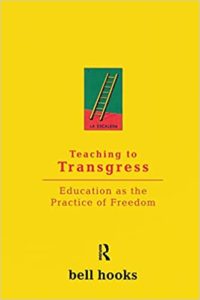
Teaching to Transgress: Education as the Practice of Freedom
By bell hooks
224 pages
In Teaching to Transgress, bell hooks–writer, teacher, and insurgent black intellectual–writes about a new kind of education, education as the practice of freedom. Teaching students to “transgress” against racial, sexual, and class boundaries in order to achieve the gift of freedom is, for hooks, the teacher’s most important goal. bell hooks speaks to the heart of education today: how can we rethink teaching practices in the age of multiculturalism? What do we do about teachers who do not want to teach, and students who do not want to learn? How should we deal with racism and sexism in the classroom? Full of passion and politics, Teaching to Transgress combines a practical knowledge of the classroom with a deeply felt connection to the world of emotions and feelings. This is the rare book about teachers and students that dares to raise questions about eros and rage, grief and reconciliation, and the future of teaching itself. “To educate is the practice of freedom,” writes bell hooks, “is a way of teaching anyone can learn.” Teaching to Transgress is the record of one gifted teacher’s struggle to make classrooms work.
Leave a Reply